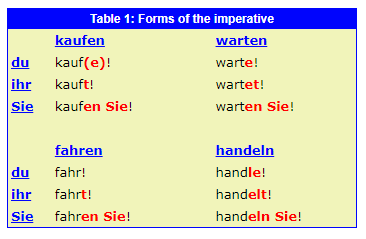The imperative is used to give orders or instructions or to express requests. The verb endings for the imperative depend on the person to whom you are talking:

Formation of the imperative
1. The "du" form of the imperative is formed by dropping the final "-en" of the infinitive and adding "-e" to the end of the word. This "-e" ending is usually dropped in spoken German and quite often in written German as well.
2. The "-e" ending on the "du" imperative is always kept with verbs whose stem end in "-d", "-t", "-ig" and "-m" or "-n" after another consonant. See for example the verb "warten" (= to wait) in the table above.
3. Verbs whose infinitive ends in "-eln" dro the "-e" of the stem in the "du" imperative but not in the "ihr" and "Sie" forms. See the verb "handeln" (= to act) in the table above.
4. The "ihr" form of the imperative is exactly the same as the "ihr" form of the regular present tense.
5. The "Sie" form of the imperative is exactly the same as the "Sie" form of the regular present tense BUT the word order is reversed - the verb always precedes the pronoun.
6. Note in particular that the "Sie" form of the imperative is the only one in which the pronoun is used in the command; you must omit the pronoun in the "du" and "ihr" forms.
 英语
英语 日语
日语 韩语
韩语 法语
法语 西班牙语
西班牙语 意大利语
意大利语 阿拉伯语
阿拉伯语 葡萄牙语
葡萄牙语 越南语
越南语 俄语
俄语 芬兰语
芬兰语 泰语
泰语 丹麦语
丹麦语 对外汉语
对外汉语



